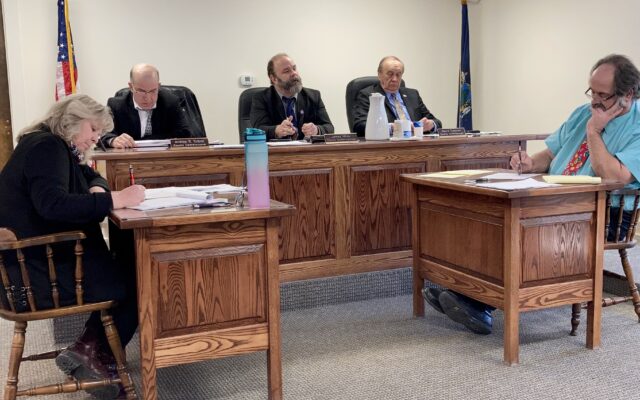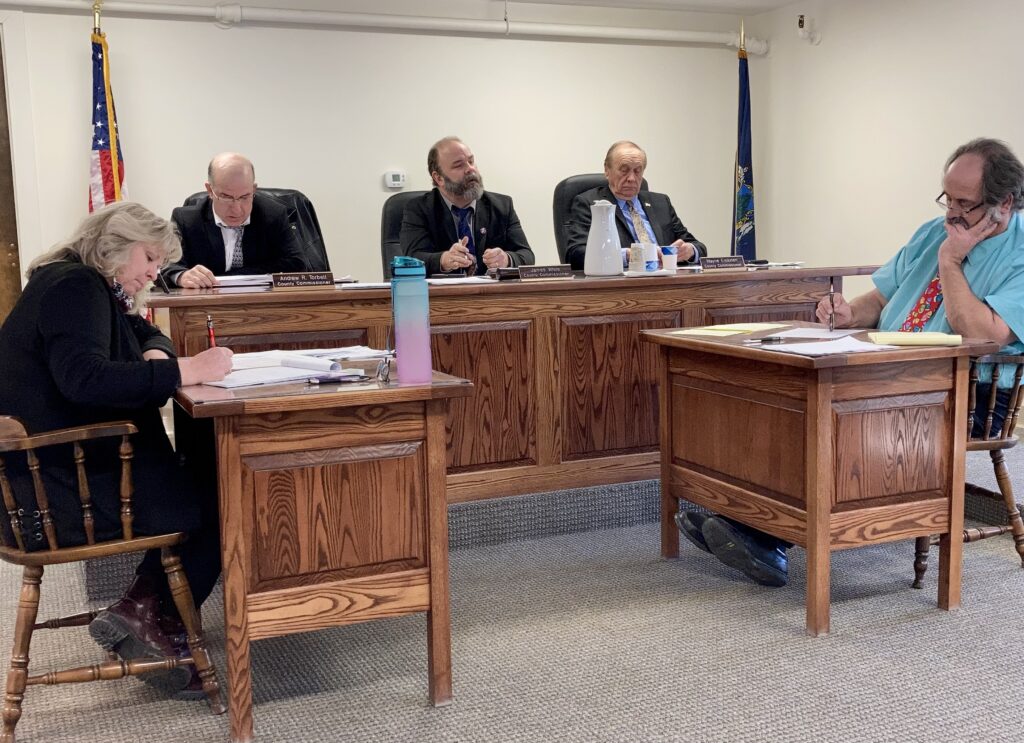
Piscataquis commissioners deny request for broadband funding in favor of radio upgrades
DOVER-FOXCROFT — Piscataquis County Commissioners rejected a request for $5,000 that would have allowed the county’s economic development council and a consulting firm to proceed with a broadband expansion project.
John Shea, Piscataquis County Economic Development Council executive director, asked for the funds in December, when Casco Bay Advisers presented its findings on a recent broadband infrastructure study to commissioners. The consulting firm estimated it would cost from $22 million to $27 million to expand coverage to unserved areas.
The $5,000 requested, paired with another $5,000 from the economic development council, would create a match for a $10,000 grant from the ConnectMaine Authority, Shea said at the time.
The $20,000 would be used to contract Brian Lippold, Casco Bay president, to help scope out projects, apply for grants and educate municipalities about broadband, Shea said Tuesday. The development council applied in January, but the grant proposal was declined, he said.

From left to right, Administrative Assistant Lori Adkins takes notes as Piscataquis County Commissioners Andrew Torbett, James White and Wayne Erkkinen discuss funds for a broadband project at a meeting Feb. 1, 2022. County Manager Michael Williams is also pictured.
County commissioners said Tuesday they would dedicate American Rescue Plan Act funds to radio communications upgrades for the county’s emergency responders rather than invest them in broadband. Internet access is spotty in rural parts of Piscataquis, an issue that limits how much growth in population and businesses the county can attract. Unreliable internet most recently was a problem for students who were sent home from schools for remote learning during COVID-19 outbreaks and teacher shortages.
The commissioners were originally supportive of the broadband study, which they helped fund, because they thought it would explore options that the county has for expanding internet, Chair James White said.
“We were sold on the idea that we need to get high-speed internet to people who want to move out to rural areas so that they could bring high-paying jobs,” he said. “What we got is, we need to use 748 miles of running wire so that we can get affordable internet to people who live up in the woods. The two aren’t the same.”
Shea interpreted the study differently. It was meant to identify gaps in the county, what it would take to upgrade areas to the best internet service possible and how much it would cost, he said. Besides benefiting those who might move to Piscataquis, the study also would help residents who don’t have reliable or fast internet at a reasonable cost, he said.
Shea might have misunderstood the commissioners’ questions and concerns last time he visited on Dec. 21, he said. He did not attend the Jan. 18 meeting, when commissioners expressed disappointment in the study and an email that Shea had sent to some town managers that listed a hypothetical funding strategy for broadband.
White reiterated that he was expecting several options for internet and gave examples, such as satellite and a neighbor getting a radio signal from Charleston Hill to his house. The chair had hoped to see “how to run fiber to some homes, how to run radio signals to some homes, how to run satellites to some homes,” he said.
The $60,000 study provided one option, and that was to “run wire everywhere,” White said, adding it would take years beyond when ARPA funds would be valid.
“I think the irony here is that technology is finally catching up to rural America, and that we have satellite coming online that can actually get into all these holes and dips … and we have the issue that we have to spend that ARPA money before you guys can even get wiring,” Commissioner Andrew Torbett said.
Shea clarified that the backlog for getting fiber in the county is 81 weeks, not 81 months. ARPA funds can be used until at least 2024, and there’s a good chance the deadline would be extended due to COVID-19-related delays, he said.
“We’ve told everybody that’s been looking for ARPA funding that we have to save it because we’ve got to get that radio situation straightened away,” Commissioner Wayne Erkkinen said. “When we have the sheriff’s department go down to Blanchard or Monson and they can’t contact anybody for help if they need it, that’s a big problem.”
Lippold said that wireless internet is the future, but the study discounted wireless because it wasn’t eligible for funding from the state and federal government. There also aren’t enough towers to allow coverage for all of the unserved areas, he said.
“We believe that [fiber] is still the lowest-cost option that will provide 100 percent coverage and the lowest service pricing,” he said, adding the study would have included satellite if it were a viable solution.
The PCEDC will continue to look for resources to support broadband expansion, Shea said Tuesday. It’s possible that towns will work independently rather than on a countywide level, he said.
Commissioners have made it clear that they will use ARPA funds for radio communications upgrades, though they don’t have solid figures to vote on yet, White said after the meeting.
They previously authorized the Piscataquis County Sheriff’s Office to explore funding options for projects estimated to cost nearly $5 million. The sheriff’s office will work with Communications Design Consulting Group on bid specs for the county dispatch center, which will move from the Piscataquis County Jail in Dover-Foxcroft to Guilford. Moving expenses are not part of the upgrade costs.